can you guess which books these are from? now open for submissions!
Don't wanna be here? Send us removal request.
Text
Do you know which book this is from?
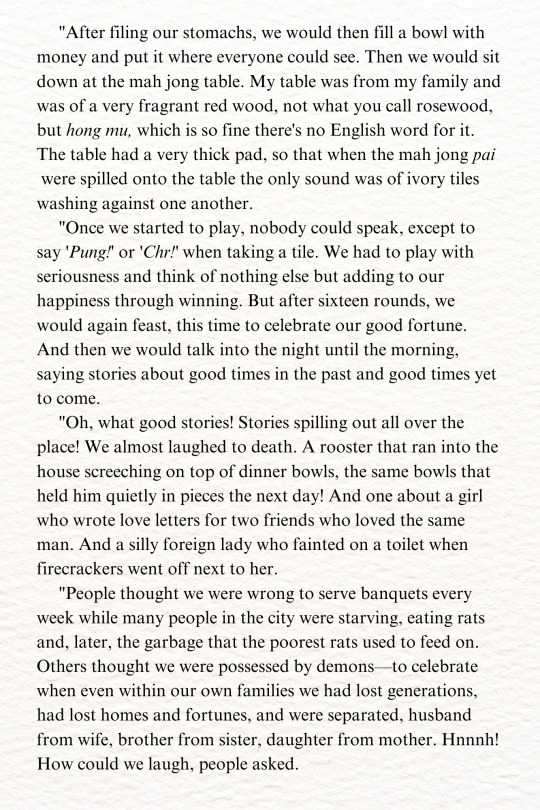
Please reblog the polls, but KEEP IT SPOILER-FREE to make people read the excerpt with an open mind 💖📚 Title and author will be revealed after the poll's conclusion.
Thank you @dent-de-l1on for the submission! 😄
4 notes
·
View notes
Text
Do you know this poem?
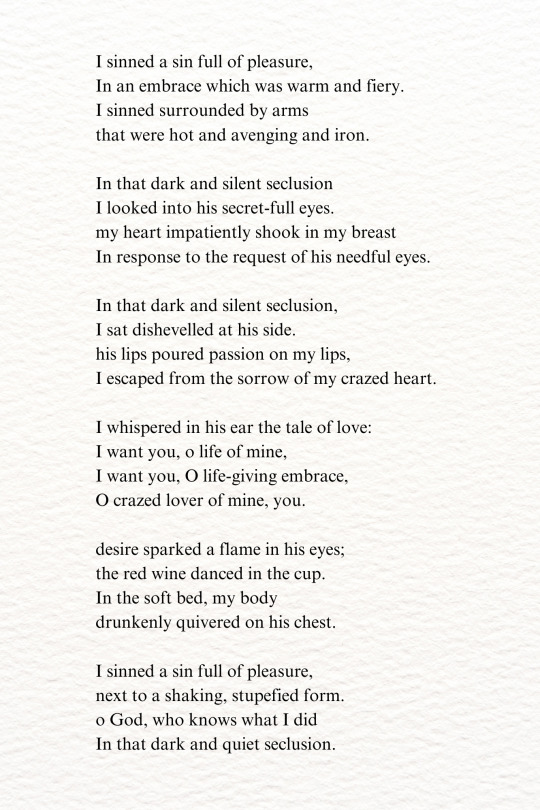
Please reblog the polls, but KEEP IT SPOILER-FREE to make people read the poem with an open mind 💖📚 Title and author will be revealed after the poll's conclusion.
34 notes
·
View notes
Text
Do you know which book this is from?

Please reblog the polls, but KEEP IT SPOILER-FREE to make people read the excerpt with an open mind 💖📚 Title and author will be revealed after the poll's conclusion.
22 notes
·
View notes
Text
Do you know which book this is from?
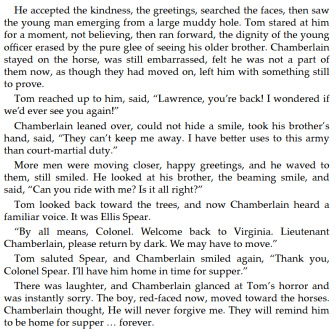
Please reblog the polls, but KEEP IT SPOILER-FREE to make people read the excerpt with an open mind 💖📚 Title and author will be revealed after the poll's conclusion.
Thank you @find-the-path for the submission! 😄
11 notes
·
View notes
Text
Do you know which book this is from?

Please reblog the polls, but KEEP IT SPOILER-FREE to make people read the excerpt with an open mind 💖📚 Title and author will be revealed after the poll's conclusion.
Thank you @dent-de-l1on for the submission! 😄
#poll#lit#literature#tumblr poll#tumblr polls#polls#poll time#book excerpt#bookblr#booklr#fiction#submission#open
4 notes
·
View notes
Text
FINAL RESULT: The majority of voters haven’t read this book, but enjoyed this excerpt. 😊
Till We Have Faces: A Myth Retold is a 1956 novel by C. S. Lewis. From Wikipedia: “The novel is a retelling of Cupid and Psyche, based on its telling in a chapter of The Golden Ass of Apuleius. This story had haunted Lewis all his life, because he believed that some of the main characters' actions were illogical. As a consequence, his retelling of the story is characterized by a highly developed character, the narrator, with the reader being drawn into her reasoning and her emotions. This was his last novel, and he considered it his most mature, written in conjunction with his wife, Joy Davidman. The first part of the book is written from the perspective of Psyche's older sister Orual, as an accusation against the gods. The story is set in the fictive kingdom of Glome, a city-state whose people have occasional contact with Hellenistic Greece. In the second part of the book, the narrator undergoes a change of mindset (Lewis would use the term conversion) and understands that her initial accusation was tainted by her own failings and shortcomings, and that the gods are lovingly present in humans' lives.
Robert Gorham Davis in The New York Times deemed it "much more convincing" than Lewis' religious novels. He wrote that the novel's "imaginative unity ... exerts ... [a] combination of awfulness, wonder and attraction".”
Do you know which book this is from?
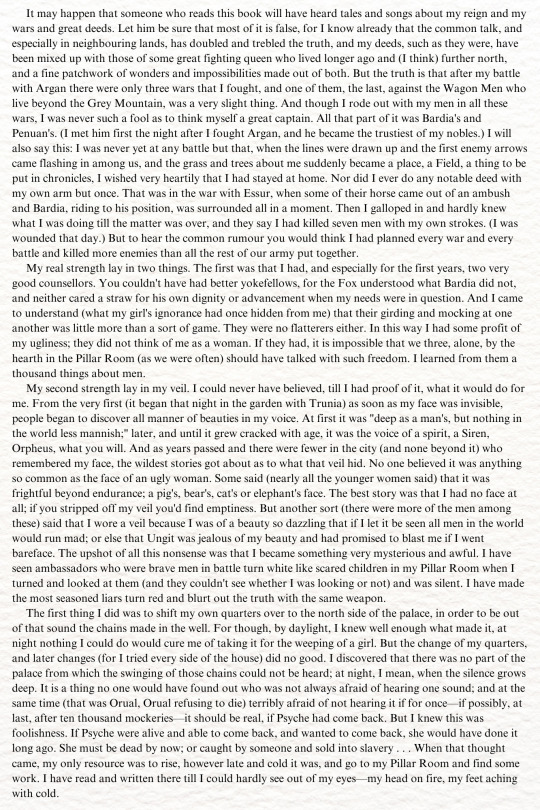
Please reblog the polls, but KEEP IT SPOILER-FREE to make people read the excerpt with an open mind 💖📚 Title and author will be revealed after the poll's conclusion.
Note: this excerpt is too long for Tumblr’s alt text character limit, so for this poll, the alt text is below the read more.
It may happen that someone who reads this book will have heard tales and songs about my reign and my wars and great deeds. Let him be sure that most of it is false, for I know already that the common talk, and especially in neighbouring lands, has doubled and trebled the truth, and my deeds, such as they were, have been mixed up with those of some great fighting queen who lived longer ago and (I think) further north, and a fine patchwork of wonders and impossibilities made out of both. But the truth is that after my battle with Argan there were only three wars that I fought, and one of them, the last, against the Wagon Men who live beyond the Grey Mountain, was a very slight thing. And though I rode out with my men in all these wars, I was never such a fool as to think myself a great captain. All that part of it was Bardia's and Penuan's. (I met him first the night after I fought Argan, and he became the trustiest of my nobles.) I will also say this: I was never yet at any battle but that, when the lines were drawn up and the first enemy arrows came flashing in among us, and the grass and trees about me suddenly became a place, a Field, a thing to be put in chronicles, I wished very heartily that I had stayed at home. Nor did I ever do any notable deed with my own arm but once. That was in the war with Essur, when some of their horse came out of an ambush and Bardia, riding to his position, was surrounded all in a moment. Then I galloped in and hardly knew what I was doing till the matter was over, and they say I had killed seven men with my own strokes. (I was wounded that day.) But to hear the common rumour you would think I had planned every war and every battle and killed more enemies than all the rest of our army put together.
My real strength lay in two things. The first was that I had, and especially for the first years, two very good counsellors. You couldn't have had better yokefellows, for the Fox understood what Bardia did not, and neither cared a straw for his own dignity or advancement when my needs were in question. And I came to understand (what my girl's ignorance had once hidden from me) that their girding and mocking at one another was little more than a sort of game. They were no flatterers either. In this way I had some profit of my ugliness; they did not think of me as a woman. If they had, it is impossible that we three, alone, by the hearth in the Pillar Room (as we were often) should have talked with such freedom. I learned from them a thousand things about men.
My second strength lay in my veil. I could never have believed, till I had proof of it, what it would do for me. From the very first (it began that night in the garden with Trunia) as soon as my face was invisible, people began to discover all manner of beauties in my voice. At first it was "deep as a man's, but nothing in the world less mannish;" later, and until it grew cracked with age, it was the voice of a spirit, a Siren, Orpheus, what you will. And as years passed and there were fewer in the city (and none beyond it) who remembered my face, the wildest stories got about as to what that veil hid. No one believed it was anything so common as the face of an ugly woman. Some said (nearly all the younger women said) that it was frightful beyond endurance; a pig's, bear's, cat's or elephant's face. The best story was that I had no face at all; if you stripped off my veil you'd find emptiness. But another sort (there were more of the men among these) said that I wore a veil because I was of a beauty so dazzling that if I let it be seen all men in the world would run mad; or else that Ungit was jealous of my beauty and had promised to blast me if I went bareface. The upshot of all this nonsense was that I became something very mysterious and awful. I have seen ambassadors who were brave men in battle turn white like scared children in my Pillar Room when I turned and looked at them (and they couldn't see whether I was looking or not) and was silent. I have made the most seasoned liars turn red and blurt out the truth with the same weapon.
The first thing I did was to shift my own quarters over to the north side of the palace, in order to be out of that sound the chains made in the well. For though, by daylight, I knew well enough what made it, at night nothing I could do would cure me of taking it for the weeping of a girl. But the change of my quarters, and later changes (for I tried every side of the house) did no good. I discovered that there was no part of the palace from which the swinging of those chains could not be heard; at night, I mean, when the silence grows deep. It is a thing no one would have found out who was not always afraid of hearing one sound; and at the same time (that was Orual, Orual refusing to die) terribly afraid of not hearing it if for once—if possibly, at last, after ten thousand mockeries—it should be real, if Psyche had come back. But I knew this was foolishness. If Psyche were alive and able to come back, and wanted to come back, she would have done it long ago. She must be dead by now; or caught by someone and sold into slavery . . . When that thought came, my only resource was to rise, however late and cold it was, and go to my Pillar Room and find some work. I have read and written there till I could hardly see out of my eyes—my head on fire, my feet aching with cold.
19 notes
·
View notes
Text
I've created a list of 100 commonly-assigned texts (at least in the USA), based both on my own experience and what I've heard from friends. I included a mixture of stuff assigned in middle school, high school, and college. Spin the wheel here and answer:
Bonus: tell us what you thought in the tags!
Use your discretion for texts you started but didn't finish for whether you count it as "read" or not.
7K notes
·
View notes
Text
Do you know which book this is from?

Please reblog the polls, but KEEP IT SPOILER-FREE to make people read the excerpt with an open mind 💖📚 Title and author will be revealed after the poll's conclusion.
22 notes
·
View notes
Text
Do you know which book this is from?
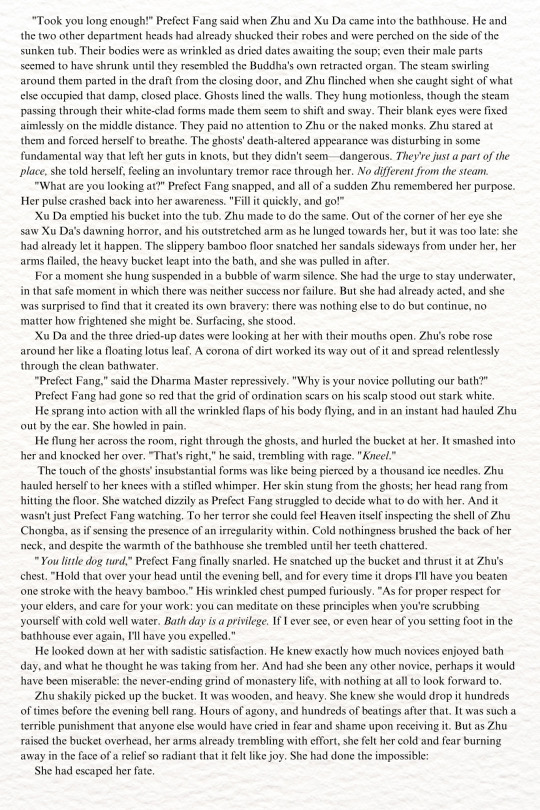
Please reblog the polls, but KEEP IT SPOILER-FREE to make people read the excerpt with an open mind 💖📚 Title and author will be revealed after the poll's conclusion.
Note: this excerpt is too long for Tumblr’s alt text character limit, so for this poll, the alt text is below the read more.
"Took you long enough!" Prefect Fang said when Zhu and Xu Da came into the bathhouse. He and the two other department heads had already shucked their robes and were perched on the side of the sunken tub. Their bodies were as wrinkled as dried dates awaiting the soup; even their male parts seemed to have shrunk until they resembled the Buddha's own retracted organ. The steam swirling around them parted in the draft from the closing door, and Zhu flinched when she caught sight of what else occupied that damp, closed place. Ghosts lined the walls. They hung motionless, though the steam passing through their white-clad forms made them seem to shift and sway. Their blank eyes were fixed aimlessly on the middle distance. They paid no attention to Zhu or the naked monks. Zhu stared at them and forced herself to breathe. The ghosts' death-altered appearance was disturbing in some fundamental way that left her guts in knots, but they didn't seem—dangerous. They're just a part of the place, she told herself, feeling an involuntary tremor race through her. No different from the steam.
"What are you looking at?" Prefect Fang snapped, and all of a sudden Zhu remembered her purpose. Her pulse crashed back into her awareness. "Fill it quickly, and go!"
Xu Da emptied his bucket into the tub. Zhu made to do the same. Out of the corner of her eye she saw Xu Da's dawning horror, and his outstretched arm as he lunged towards her, but it was too late: she had already let it happen. The slippery bamboo floor snatched her sandals sideways from under her, her arms flailed, the heavy bucket leapt into the bath, and she was pulled in after.
For a moment she hung suspended in a bubble of warm silence. She had the urge to stay underwater, in that safe moment in which there was neither success nor failure. But she had already acted, and she was surprised to find that it created its own bravery: there was nothing else to do but continue, no matter how frightened she might be. Surfacing, she stood.
Xu Da and the three dried-up dates were looking at her with their mouths open. Zhu's robe rose around her like a floating lotus leaf. A corona of dirt worked its way out of it and spread relentlessly through the clean bathwater.
"Prefect Fang," said the Dharma Master repressively. "Why is your novice polluting our bath?"
Prefect Fang had gone so red that the grid of ordination scars on his scalp stood out stark white. He sprang into action with all the wrinkled flaps of his body flying, and in an instant had hauled Zhu out by the ear. She howled in pain.
He flung her across the room, right through the ghosts, and hurled the bucket at her. It smashed into her and knocked her over. "That's right," he said, trembling with rage. "Kneel."
The touch of the ghosts' insubstantial forms was like being pierced by a thousand ice needles. Zhu hauled herself to her knees with a stifled whimper. Her skin stung from the ghosts; her head rang from hitting the floor. She watched dizzily as Prefect Fang struggled to decide what to do with her. And it wasn't just Prefect Fang watching. To her terror she could feel Heaven itself inspecting the shell of Zhu Chongba, as if sensing the presence of an irregularity within. Cold nothingness brushed the back of her neck, and despite the warmth of the bathhouse she trembled until her teeth chattered.
"You little dog turd," Prefect Fang finally snarled. He snatched up the bucket and thrust it at Zhu's chest. "Hold that over your head until the evening bell, and for every time it drops I'll have you beaten one stroke with the heavy bamboo." His wrinkled chest pumped furiously. "As for proper respect for your elders, and care for your work: you can meditate on these principles when you're scrubbing yourself with cold well water. Bath day is a privilege. If I ever see, or even hear of you setting foot in the bathhouse ever again, I'll have you expelled."
He looked down at her with sadistic satisfaction. He knew exactly how much novices enjoyed bath day, and what he thought he was taking from her. And had she been any other novice, perhaps it would have been miserable: the never-ending grind of monastery life, with nothing at all to look forward to.
Zhu shakily picked up the bucket. It was wooden, and heavy. She knew she would drop it hundreds of times before the evening bell rang. Hours of agony, and hundreds of beatings after that. It was such a terrible punishment that anyone else would have cried in fear and shame upon receiving it. But as Zhu raised the bucket overhead, her arms already trembling with effort, she felt her cold and fear burning away in the face of a relief so radiant that it felt like joy. She had done the impossible:
She had escaped her fate.
21 notes
·
View notes
Text
Do you know which book this is from?

Please reblog the polls, but KEEP IT SPOILER-FREE to make people read the excerpt with an open mind 💖📚 Title and author will be revealed after the poll's conclusion.
Note: this excerpt is too long for Tumblr’s alt text character limit, so for this poll, the alt text is below the read more.
It may happen that someone who reads this book will have heard tales and songs about my reign and my wars and great deeds. Let him be sure that most of it is false, for I know already that the common talk, and especially in neighbouring lands, has doubled and trebled the truth, and my deeds, such as they were, have been mixed up with those of some great fighting queen who lived longer ago and (I think) further north, and a fine patchwork of wonders and impossibilities made out of both. But the truth is that after my battle with Argan there were only three wars that I fought, and one of them, the last, against the Wagon Men who live beyond the Grey Mountain, was a very slight thing. And though I rode out with my men in all these wars, I was never such a fool as to think myself a great captain. All that part of it was Bardia's and Penuan's. (I met him first the night after I fought Argan, and he became the trustiest of my nobles.) I will also say this: I was never yet at any battle but that, when the lines were drawn up and the first enemy arrows came flashing in among us, and the grass and trees about me suddenly became a place, a Field, a thing to be put in chronicles, I wished very heartily that I had stayed at home. Nor did I ever do any notable deed with my own arm but once. That was in the war with Essur, when some of their horse came out of an ambush and Bardia, riding to his position, was surrounded all in a moment. Then I galloped in and hardly knew what I was doing till the matter was over, and they say I had killed seven men with my own strokes. (I was wounded that day.) But to hear the common rumour you would think I had planned every war and every battle and killed more enemies than all the rest of our army put together.
My real strength lay in two things. The first was that I had, and especially for the first years, two very good counsellors. You couldn't have had better yokefellows, for the Fox understood what Bardia did not, and neither cared a straw for his own dignity or advancement when my needs were in question. And I came to understand (what my girl's ignorance had once hidden from me) that their girding and mocking at one another was little more than a sort of game. They were no flatterers either. In this way I had some profit of my ugliness; they did not think of me as a woman. If they had, it is impossible that we three, alone, by the hearth in the Pillar Room (as we were often) should have talked with such freedom. I learned from them a thousand things about men.
My second strength lay in my veil. I could never have believed, till I had proof of it, what it would do for me. From the very first (it began that night in the garden with Trunia) as soon as my face was invisible, people began to discover all manner of beauties in my voice. At first it was "deep as a man's, but nothing in the world less mannish;" later, and until it grew cracked with age, it was the voice of a spirit, a Siren, Orpheus, what you will. And as years passed and there were fewer in the city (and none beyond it) who remembered my face, the wildest stories got about as to what that veil hid. No one believed it was anything so common as the face of an ugly woman. Some said (nearly all the younger women said) that it was frightful beyond endurance; a pig's, bear's, cat's or elephant's face. The best story was that I had no face at all; if you stripped off my veil you'd find emptiness. But another sort (there were more of the men among these) said that I wore a veil because I was of a beauty so dazzling that if I let it be seen all men in the world would run mad; or else that Ungit was jealous of my beauty and had promised to blast me if I went bareface. The upshot of all this nonsense was that I became something very mysterious and awful. I have seen ambassadors who were brave men in battle turn white like scared children in my Pillar Room when I turned and looked at them (and they couldn't see whether I was looking or not) and was silent. I have made the most seasoned liars turn red and blurt out the truth with the same weapon.
The first thing I did was to shift my own quarters over to the north side of the palace, in order to be out of that sound the chains made in the well. For though, by daylight, I knew well enough what made it, at night nothing I could do would cure me of taking it for the weeping of a girl. But the change of my quarters, and later changes (for I tried every side of the house) did no good. I discovered that there was no part of the palace from which the swinging of those chains could not be heard; at night, I mean, when the silence grows deep. It is a thing no one would have found out who was not always afraid of hearing one sound; and at the same time (that was Orual, Orual refusing to die) terribly afraid of not hearing it if for once—if possibly, at last, after ten thousand mockeries—it should be real, if Psyche had come back. But I knew this was foolishness. If Psyche were alive and able to come back, and wanted to come back, she would have done it long ago. She must be dead by now; or caught by someone and sold into slavery . . . When that thought came, my only resource was to rise, however late and cold it was, and go to my Pillar Room and find some work. I have read and written there till I could hardly see out of my eyes—my head on fire, my feet aching with cold.
19 notes
·
View notes
Text
Do you know which book this is from?
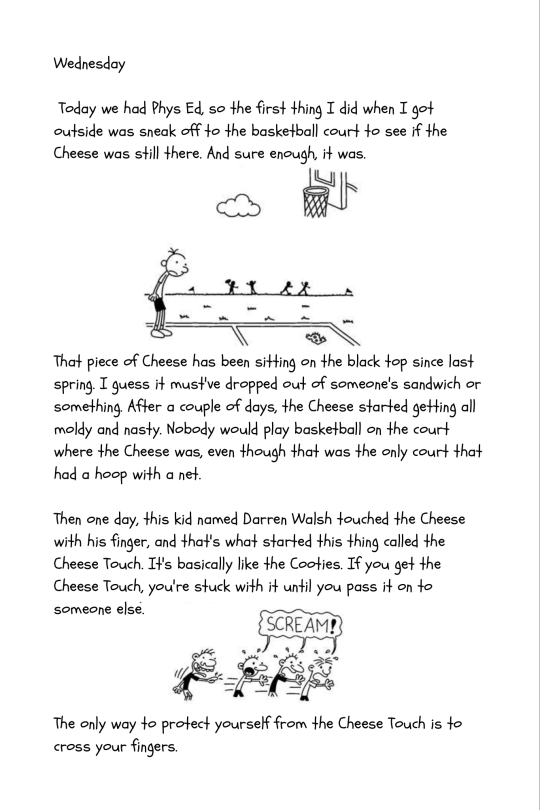
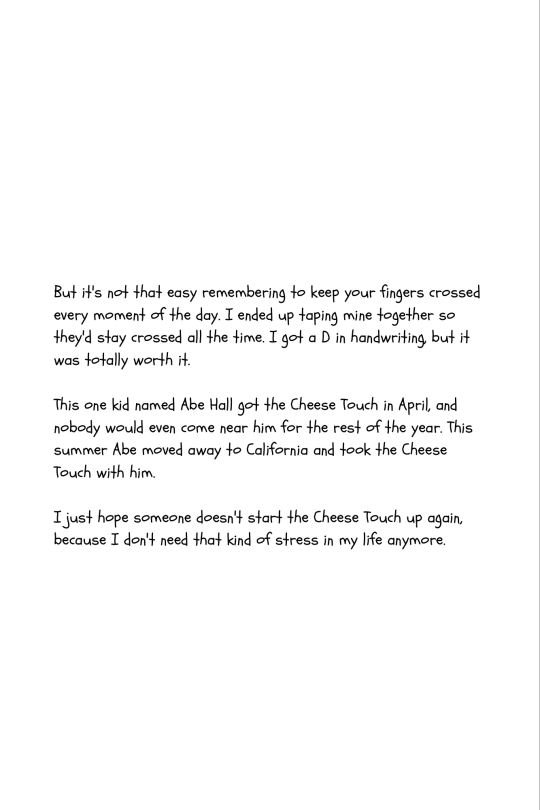
Please reblog the polls, but KEEP IT SPOILER-FREE to make people read the excerpt with an open mind 💖📚 Title and author will be revealed after the poll's conclusion.
Thank you @nabwastaken for the submission! 😄
43 notes
·
View notes
Text
Do you know which book this is from?

Please reblog the polls, but KEEP IT SPOILER-FREE to make people read the excerpt with an open mind 💖📚 Title and author will be revealed after the poll's conclusion.
#poll#lit#literature#tumblr poll#tumblr polls#polls#poll time#book excerpt#booklr#bookblr#fiction#science fiction#open
22 notes
·
View notes
Text
Do you know which book this is from?
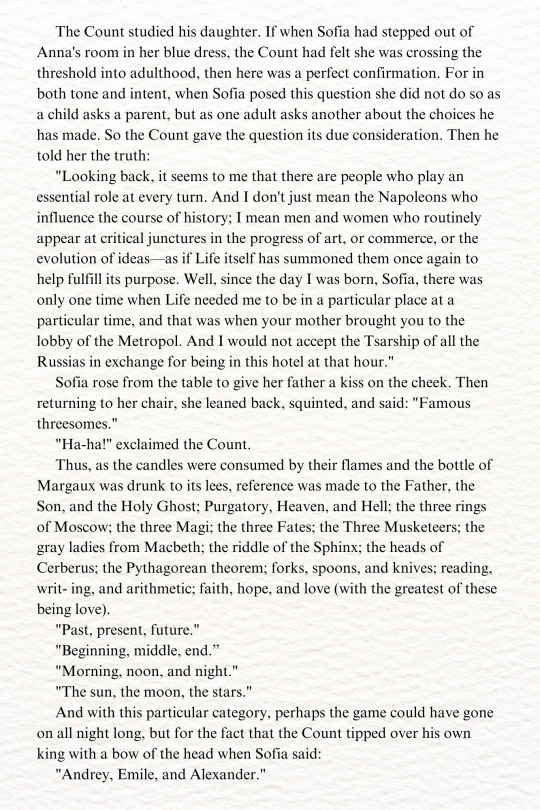
Please reblog the polls, but KEEP IT SPOILER-FREE to make people read the excerpt with an open mind 💖📚 Title and author will be revealed after the poll's conclusion.
Thank you @gay-kurapika for the submission! 😄
23 notes
·
View notes
Text
Do you know which book this is from?

Please reblog the polls, but KEEP IT SPOILER-FREE to make people read the excerpt with an open mind 💖📚 Title and author will be revealed after the poll's conclusion.
Note: this excerpt is too long for Tumblr’s alt text character limit, so for this poll, the alt text is below the read more.
It may happen that someone who reads this book will have heard tales and songs about my reign and my wars and great deeds. Let him be sure that most of it is false, for I know already that the common talk, and especially in neighbouring lands, has doubled and trebled the truth, and my deeds, such as they were, have been mixed up with those of some great fighting queen who lived longer ago and (I think) further north, and a fine patchwork of wonders and impossibilities made out of both. But the truth is that after my battle with Argan there were only three wars that I fought, and one of them, the last, against the Wagon Men who live beyond the Grey Mountain, was a very slight thing. And though I rode out with my men in all these wars, I was never such a fool as to think myself a great captain. All that part of it was Bardia's and Penuan's. (I met him first the night after I fought Argan, and he became the trustiest of my nobles.) I will also say this: I was never yet at any battle but that, when the lines were drawn up and the first enemy arrows came flashing in among us, and the grass and trees about me suddenly became a place, a Field, a thing to be put in chronicles, I wished very heartily that I had stayed at home. Nor did I ever do any notable deed with my own arm but once. That was in the war with Essur, when some of their horse came out of an ambush and Bardia, riding to his position, was surrounded all in a moment. Then I galloped in and hardly knew what I was doing till the matter was over, and they say I had killed seven men with my own strokes. (I was wounded that day.) But to hear the common rumour you would think I had planned every war and every battle and killed more enemies than all the rest of our army put together.
My real strength lay in two things. The first was that I had, and especially for the first years, two very good counsellors. You couldn't have had better yokefellows, for the Fox understood what Bardia did not, and neither cared a straw for his own dignity or advancement when my needs were in question. And I came to understand (what my girl's ignorance had once hidden from me) that their girding and mocking at one another was little more than a sort of game. They were no flatterers either. In this way I had some profit of my ugliness; they did not think of me as a woman. If they had, it is impossible that we three, alone, by the hearth in the Pillar Room (as we were often) should have talked with such freedom. I learned from them a thousand things about men.
My second strength lay in my veil. I could never have believed, till I had proof of it, what it would do for me. From the very first (it began that night in the garden with Trunia) as soon as my face was invisible, people began to discover all manner of beauties in my voice. At first it was "deep as a man's, but nothing in the world less mannish;" later, and until it grew cracked with age, it was the voice of a spirit, a Siren, Orpheus, what you will. And as years passed and there were fewer in the city (and none beyond it) who remembered my face, the wildest stories got about as to what that veil hid. No one believed it was anything so common as the face of an ugly woman. Some said (nearly all the younger women said) that it was frightful beyond endurance; a pig's, bear's, cat's or elephant's face. The best story was that I had no face at all; if you stripped off my veil you'd find emptiness. But another sort (there were more of the men among these) said that I wore a veil because I was of a beauty so dazzling that if I let it be seen all men in the world would run mad; or else that Ungit was jealous of my beauty and had promised to blast me if I went bareface. The upshot of all this nonsense was that I became something very mysterious and awful. I have seen ambassadors who were brave men in battle turn white like scared children in my Pillar Room when I turned and looked at them (and they couldn't see whether I was looking or not) and was silent. I have made the most seasoned liars turn red and blurt out the truth with the same weapon.
The first thing I did was to shift my own quarters over to the north side of the palace, in order to be out of that sound the chains made in the well. For though, by daylight, I knew well enough what made it, at night nothing I could do would cure me of taking it for the weeping of a girl. But the change of my quarters, and later changes (for I tried every side of the house) did no good. I discovered that there was no part of the palace from which the swinging of those chains could not be heard; at night, I mean, when the silence grows deep. It is a thing no one would have found out who was not always afraid of hearing one sound; and at the same time (that was Orual, Orual refusing to die) terribly afraid of not hearing it if for once—if possibly, at last, after ten thousand mockeries—it should be real, if Psyche had come back. But I knew this was foolishness. If Psyche were alive and able to come back, and wanted to come back, she would have done it long ago. She must be dead by now; or caught by someone and sold into slavery . . . When that thought came, my only resource was to rise, however late and cold it was, and go to my Pillar Room and find some work. I have read and written there till I could hardly see out of my eyes—my head on fire, my feet aching with cold.
19 notes
·
View notes
Text
It is November of 1893. You have just killed a vampire. Exhausted and worn, you close your eyes and rest.
You wake up. It is May of 1893. You are on a train en route to Transylvania. Your diary says you have had queer dreams lately.
You try to believe it.
(An old woman puts a rosary in your hands. You accept it without question.)
You are a guest in a castle you have never been in before (you recognize every hallway and know without trying that every door is locked). Your host is a man you have never met before (you killed him you killed him you killed him he had turned to dust and there was blood on the snow).
One morning you cut yourself while shaving.
There is nobody behind you in the pocket mirror’s reflection.
You turn fast, and the razor is like a Kukri knife in your hand.
41K notes
·
View notes
Text
FINAL RESULT: The majority of voters haven’t read this book, but enjoyed this excerpt. 😊
Novice Dragoneer is a 2019 fantasy novel by E.E. Knight. From the book’s official summary: “An impoverished girl enters into a military order of dragonriders, but her path won’t be as easy or as straightforward as she expected. Fourteen-year-old Ileth grew up in an orphanage, and thanks to her stutter was never thought to be destined for much beyond kitchen work and cleaning. But she’s dreamed of serving with the dragons ever since a childhood meeting with a glittering silver dragon and its female dragoneer. For years she waits, and as soon as she is old enough to join, Ileth runs away to become a novice dragoneer at the ancient human-dragon fortress of the Serpentine. While most of her fellow apprentices are from rich and influential families, Ileth must fight for her place in the world, even if it includes a duel with her boss at the fish-gutting table. She’s then sent off to the dragon-dancers after a foolish kiss with a famously named boy and given charge of a sickly old dragon with a mysterious past. But she finds those trials were nothing when she has to take the place of a dead dragoneer and care for his imprisoned dragon in enemy lands.”
The book has one sequel, Daughter of the Serpentine.
Do you know which book this is from?
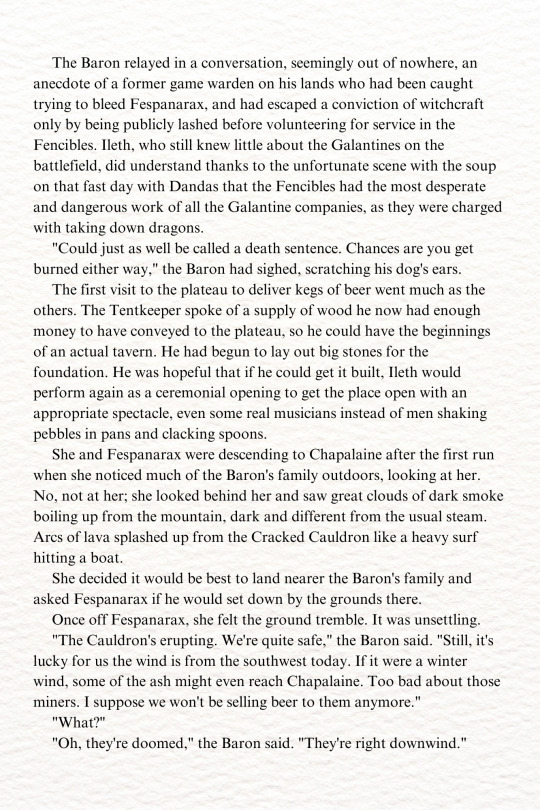
Please reblog the polls, but KEEP IT SPOILER-FREE to make people read the excerpt with an open mind 💖📚 Title and author will be revealed after the poll's conclusion.
Thank you @pearlhoardingdragon for the submission! 😄
14 notes
·
View notes
Text
Do you know which book this is from?
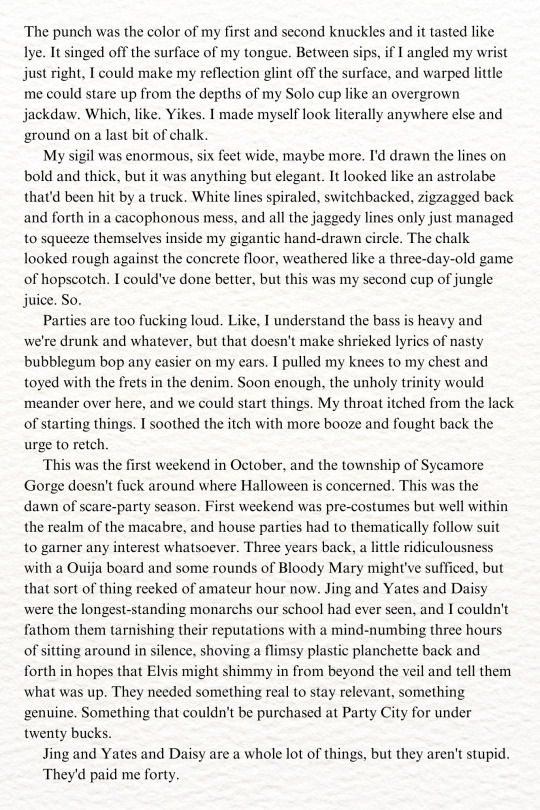
Please reblog the polls, but KEEP IT SPOILER-FREE to make people read the excerpt with an open mind 💖📚 Title and author will be revealed after the poll's conclusion.
Thank you @halfthealphabet for the submission! 😄
63 notes
·
View notes